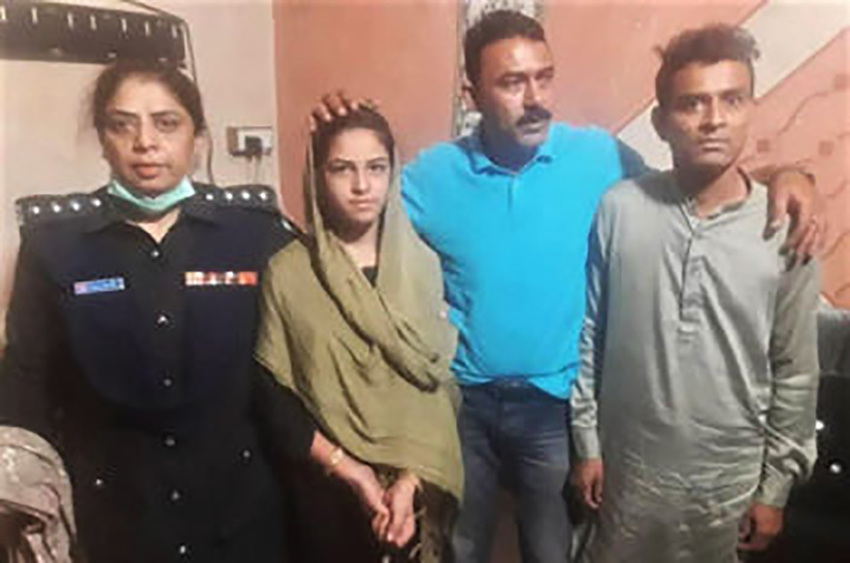Court to decide fate of kidnapped Pakistani Christian girl after medical exam in child marriage case

A Pakistani court ordered that a Christian girl abducted and forced to wed a Muslim man be removed from her captor's home and sent to a government-run shelter until a medical examination determines whether she's of legal age to marry.
On Monday, a court ordered police to arrest Ali Azhar, 44, and remove Arzoo Raja, 13, from his home until she's examined to determine if he violated Pakistan’s laws against child marriage.
Raja was abducted from her home by Azhar on Oct. 13, International Christian Concern reported. She later signed a paper saying she had converted to Islam and married Azhar of her own free will.
Young girls in similar circumstances as Raja face threats of violence and rape to force their cooperation with captors, International Christian Concern’s South Asia Regional Manager, Will Stark, told The Christian Post.
Stark said Monday's court order was "a victory along the road to the main victory.”
“Based on the statements the governor and the federal minister made, things indicate she might be returned to her family,” he added.
The court’s decision to free Raja from her captor reversed its previous decision to validate the abduction and illegal marriage. Often, courts use Islamic Sharia law to bypass Pakistan’s secular laws, which forbid child marriage.
“It’s unclear exactly what changed to make this happen,” Stark said. “The best way to try to figure it out is to look at the activities that led to the court order. It starts with the federal minister for human rights in Pakistan.”
Pakistan’s Minister for Human Rights, Shireen Mazari, said in a statement on Twitter Sunday that her lawyer had filed an intervention: “On the Arzoo case, today judge has ordered the girl be recovered by police & relevant agencies & be shifted to a shelter home. Next hearing fixed for Thursday morning. My lawyer has informed court that an intervener will be filed on my behalf.”
On Thursday, Raja appeared before the Sindh High Court to testify. There, she testified that she was 18, hadn't been abducted, had chosen to convert to Islam, and married Azhar by her own choice, International Christian Concern reported.
According to Stark, Azhar probably threatened Raja into giving false testimony. Another girl in a similar situation, Maira Shahbaz, was abducted and gang-raped. Her captor said if she didn’t back him with her court testimony, he would release video of the rape online.
That Raja is now being held at a shelter doesn’t remove the threats against her, Stark said. Among Pakistan’s Christians, the government-run shelters have a reputation for applying pressure to live by Islamic law, which allows child marriage. And Raja can’t go back home because she signed a paper saying she converted to Islam, he said.
Pakistani law doesn’t allow parents to regain custody of their children who've changed their religion, he said. Even if the courts invalidate Raja’s marriage, they might not invalidate her conversion to Islam.
“When a girl has supposedly converted and married to someone else, the custody of the girl changes. She can’t be allowed to go back to her home because if she’s a Muslim, she shouldn’t be raised by Christians," Stark said.
The key factor in Raja’s case will be the medical test to determine her age, Stark explained. Although her parents have already offered the court a birth certificate and baptism certificate to prove her age, the government requires the medical tests.
He also raised concerns that the physical examination might be an attempt to legitimize the marriage. Or they might be using the tests as a way to shift the focus of the case from Raja’s religion to her age.
“There are some concerns there about what the medical team will find,” he said. “The court is seeking for a way to have the right optics come out. Most Muslims in Pakistan would be pretty upset about allowing a child marriage to stand. Making the case about age and not religion puts out the right optic.”
If Raja wins her case, it won’t set a legal precedent against child marriage, Stark said. Pakistan already has laws against child marriage. The laws aren’t enforced because radical Muslim groups threaten people who try to do justice.
“People won’t cite this case, but they will probably look at the involvement of the federal government and know that if they have an egregious child marriage case, the federal government might get involved,” he said.



























